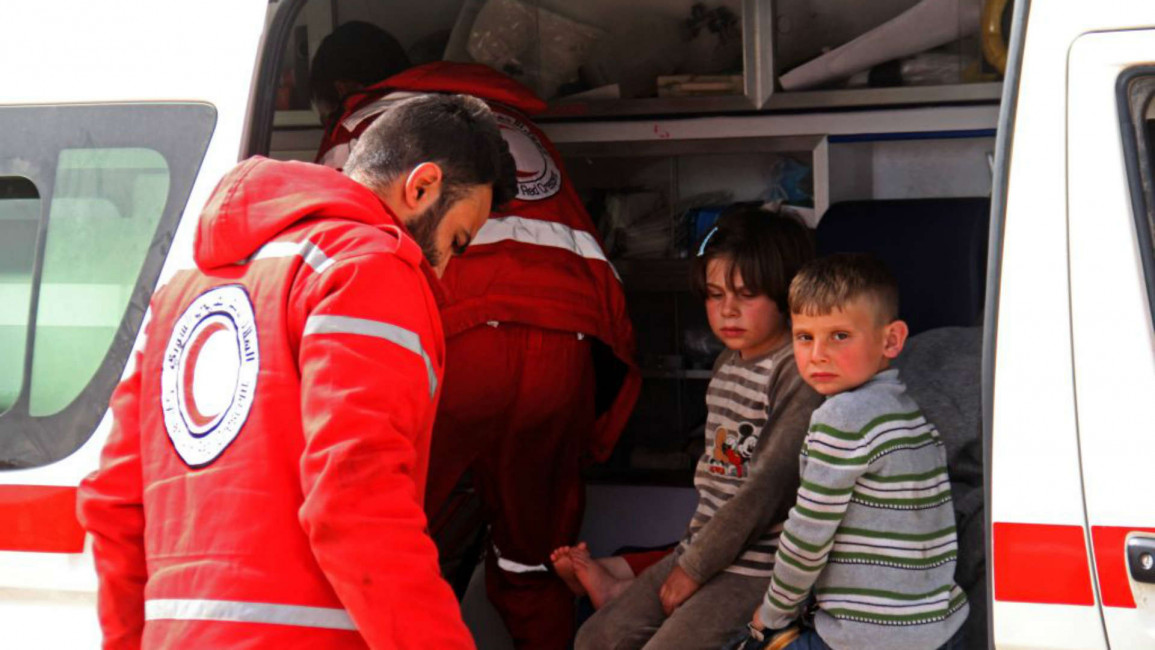
Syria's revolution was nothing to do with sectarianism
When one surveys the brutal chaos of Syria, whether it's the massacre of innocents by chemical weapons or by "conventional" ones, one can't help but feel as if such brutality is now the order of the day - that it has become the main mode of operation of the Syrian war.
Whatever the message of the Syrian revolution when it first began as peaceful street protests in 2011, it has been drowned in blood and overshadowed by relentless nightmares.
Last week, buses in the Syrian town of Rashidin carrying evacuees from the mostly Shia towns of Fuah and Kafriya were targeted by a suicide bomber. One hundred and twenty-six innocents, including 70 children, were murdered in the attack.
Aside from the general brutality and the thought of so much innocent life lost, my general despair at such an attack - which is of course nothing compared to the suffering of the victims - was exacerbated by the general air of dehumanisation that followed.
I've long criticised the western media for dehumanising and demonising rebels and Syrians who oppose Assad - I felt the same outrage when on the day of the attack I heard a CNN report that referred to the victims of the Rashidin attack as "pro-Assad civilians" and, even more monstrously, "supporters of Bashar al-Assad".
These were children. These were innocent men and women who have absolutely zero control over their circumstances. Has the culture of dehumanising victims of conflicts in far-away lands really got so bad that mainstream news outlets feel comfortable calling children murdered by a sectarian fascist suicide bomber "supporters of Bashar al-Assad"?
 |
In the black and white world provided to us by safety and peace, we can adopt easy narratives |  |
In the black and white world provided to us by safety and peace, we can adopt easy narratives and endorse simplistic dichotomies that would call the Shia residents of Fuah and Kafriya "Assad supporters".
But these narrative and dichotomies, while easy to understand, feed into sectarianism and, more aptly, the sectarianisation of the conflict that Bashar al-Assad and Iran have determined with savage success.
If these civilians appear to support Assad, it is out of well documented coercion and propaganda, but also legitimate fear of the kind of sectarian fascists who perpetrated this attack, and who are ideologically committed to genocide of the Shia and domination of other minorities.
It does the cause of the revolution no favours to either endorse the dichotomy that would reduce the victims of this attack to "Assad supporters", or to pretend that there aren't forces in Syria - even among armed groups opposed to Assad, such as the Islamic State group - who are capable of carrying out such an attack.
 |
It does the cause of the revolution no favours to either endorse the dichotomy that would reduce the victims of this attack to 'Assad supporters' |  |
While it's true that the people of Fuah and Kafriya were only being evacuated due to Assad and Iran's war effort, the fact is that it was rebels who had laid siege to the towns for months prior to the deal.
This deal allowed Sunni civilians from Madaya and Zabadani, who were deliberately starved by the regime, to go to Idlib in exchange for the evacuation of Shia civilians from the two rebel-besieged towns, demonstrating just how much sectarianisation has crept into the revolutionary war.
The regime and Iran want "tit-for-tat" sectarianism, people reduced to pawns and the ability to shift demographics, as it provides them with a sectarian logic used to shore up their own base.
| Read more: Watchdog rejects Russian-Iranian bid for new Syria chemical probe | |
Even more indicative of the extent to which Assad and his allies' mode of operation has come to dominate the situation is the way some supporters of the Syrian opposition immediately concluded that the attack was a "false flag" carried out by Assad to demonise the rebels.
It's perfectly true that both Assad and Iran have used the attack to rhetorically justify their genocidal agenda in Syria. However, it was quite surreal to hear opposition activists who had spent the past week arguing against the regime's claims of the Khan Sheikhun massacre of civilians in a rebel-held area being a "false flag" suddenly endorse the same logic when it came to an attack on allegedly "pro-regime" civilians.
 |
Assad and his allies feast on the act of eroding 'truth' |  |
Again, not only does endorsing these ideas minimise the existence of anti-Shia sectarian forces in Syria, but it plays the Assad regime at its own game, a game that Assad is much better at, given he determined its rules.
Assad and his allies feast on the act of eroding "truth" so that even their most overt crimes can be denied and obfuscated - and so that, instead of talking or doing something about the criminal, people are bogged down fighting a haze of lies and misinformation regarding the crime itself.
One might argue that it's perfectly natural for Syrians to attribute the slaughter of innocents to Assad and his allies - the perpetrators of the vast majority of the killings in Syria - but everything suggests that this attack was perpetrated by a Salafi jihadist group.
The motive is obvious - the targets were Shia civilians who were being evacuated as part of a deal struck between Iran and the moderate Islamist Ahrar al-Sham and endorsed by Tahrir al-Sham (HTS), the coalition led by the former al-Qaeda affiliate Jabhat Fateh al-Sham (JFS).
 |
The modus operandi has Salafi jihadism written all over it, with the familiar use of a suicide car bomb |  |
The modus operandi has Salafi jihadism written all over it, with the familiar use of a suicide car bomb. It ought to be obvious that, morally speaking, the Assad regime is not above committing such a crime, but his regime has never used suicide attacks and it makes no sense for his regime to launch an attack on Shia civilians who were being evacuated as part of a deal struck by its main sponsor, Iran.
While no group has taken responsibility, the attack has all the indicators to suggest it was perpetrated by IS, or, given its presence near to the attack site, the IS-affiliated Jund al-Aqsa.
There is also the more remote, but hardly unthinkable, possibility that a rogue brigade or splinter of JFS carried out the attack - as with the massacre of Druze in Qalb Lawzah, we know that it contains factions that can commit sectarian atrocities and its own rhetoric and ideology is rooted in fascistic Salafist sectarianism against Shia.
JFS has a de-centralised structure, itself pertaining to a kind of makeshift "emirate", with brigades being widely different in terms of ideology and loyalty to the leadership. Again, to deny that forces aligned with JFS are capable of this kind of attack is to vastly underestimate the process by which sectarianisation has taken root in Syria, after being deliberately cultivated by Assad and Iran.
However, it is important to note that members of both Ahrar al-Sham - which immediately condemned the attack as 'cowardly' - and HTS were protecting the convoy at the time of the attack and lost fighters due to it.
The Syrian revolution, at is very core, was about Syrians, regardless of confession, uniting to rid themselves of a brutal tyrant. It certainly wasn't about tit-for-tat sectarianism and dehumanising Syrians based on sectarian allegiance.
 |
It's this impulsive, natural anti-sectarian humanism that Assad has worked so hard to snuff out |  |
But there was one aspect of the attack in Rashidin that subverted my despair and reminded me precisely why this war is being fought.
While the regime and its supporters have rushed to exploit this atrocity to attack the rebellion, the very first responders to the attacks were the White Helmets - maligned so viciously by the regime and its supporters as sectarians and supporters of "al-Qaeda" - as well as pro-revolution media figures and activists who had gathered to cover the evacuation.
These people rushed into the flames to salvage as many lives as possible, including someone whose family had been murdered by pro-regime sectarian militias in Binnish, alongside people who have faced the full brutalities of the regime and its allies in Aleppo and across Syria.
While sectarian brutality often breeds sectarian brutality, it can also breed its antithesis - when you've seen as much death and destruction as Syrians have, you might truly understand that old cliche - that Sunnis and Shia bleed the same blood; that the loved ones of dead civilians shed the same tears, regardless of faith.
It's this impulsive, natural anti-sectarian humanism that Assad has worked so hard to snuff out. If Syria is to be defined by savagery, one doesn't need to concoct conspiracies or deny sectarianism to understand that it is Assad who has made it so.
Sam Hamad is an independent Scottish-Egyptian activist and writer.
Opinions expressed in this article remain those of the author and do not necessarily represent those of The New Arab, its editorial board or staff.




